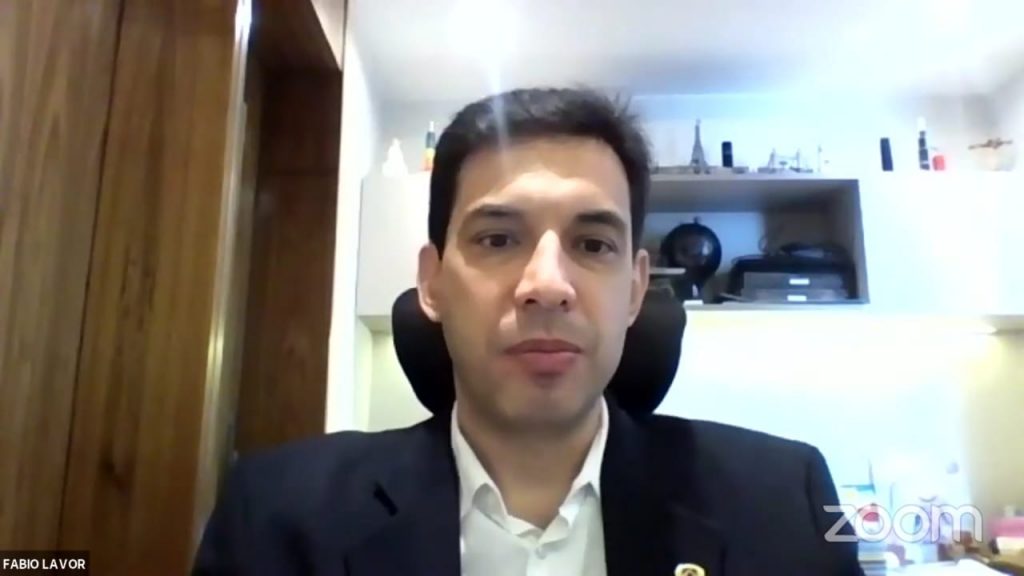São Paulo – Ports across Brazil saw a 4% increase in cargo throughput year-to-date through May from a year ago. So said the Brazilian Secretariat for Ports’ New Concessions and Port Regulation Policies director, Fabio Lavor (pictured above) during the webinar “The impact of the Covid-19 crisis on Arab logistics: Challenges and opportunities for Arab-South American partnerships.” The event was hosted this Wednesday (12) by the Arab Brazilian Chamber of Commerce (ABCC) and the Union of Arab Chambers, and it got some 900 viewers in Brazil and the world over.
Lavor said the results were brought about by industry investment and long-term strategy. “Of course we are being affected right now, but we are managing to get by, and one reason is our cargo profile. We are on our way to a record-high throughput this year, when you factor in both exports and imports,” he said. The director urged Arab companies to join the Brazilian government’s privatization efforts, with 13 new concession tenders held in 2019 and another 20 slated for next year. “We would like to see more Arab participation, particularly in port logistics,” he said. One of the goals is to award management to the private sector at the Port of Santos, which handles one third of trade in Brazil.

A major player in the Arab world, the Suez Canal Economic Zone has also kept going amid the crisis. “It was very important to keep up the work in spite of the pandemic. Logistics is a key sector when it comes to supporting small and medium enterprises, which are struggling right now, but play a very important role,” explained Suez Canal Economic Zone chairman Yahia Zaki. The economic zone manages the canal as well as many of its ports.
Transportation costs are a major hurdle at this time, Zaki said. The biggest challenge in is fast-tracking commodity trade integration between the regions surrounding the canal, which is seen as a gateway for trade in the African continent. He also said his organization is hoping to build rapport with ports in Brazil and South America.

In a bid to brace for the impact of Covid-19, Tessa Major, the vice president for Central and South America at the International Association of Ports and Harbors (IAPH) and International Business and Innovation Director at Port of Açu, sought out information from her peers around the world. “We put together a taskforce and we relied on a network of ports to figure out how parts of the world were being affected. That enabled us to draft a document to advise ports regarding global best practices,” said Major.
The Port of Açu near Rio de Janeiro acts as a gateway to the state of Minas Gerais. “Our logistics are largely road-based. We will have a regular cabotage route connecting the Port of Rio de Janeiro and the Port of Açu, starting in September,” she said, in a reference to close-to-shore shipping of goods between two points in one single country. Regarding coronavirus, Major explains that port activity is picking back up slightly. “The long-term impact is still uncertain, but as a rule of thumb ports are chasing a more risk-resilient profile with additional sources of revenue,” she said.

Another change in profile, which freight forwarding agency Unimar’s Projects and New Business manager Pedro Oliveira asked about, concerns the type of products traded between Brazil and the Arab countries. “As oil prices went down, Arab countries must have stepped up their diversification efforts. I think we should look into what types of cargo are selling more of to Brazil,” he said.

Foodstuffs will be given preference in shipping, explained the dean of the College of International Transport and Logistics of the Arab Academy for Science Technology & Maritime Transport (AASTMT) and economic adviser to the Union of Arab Chambers, Sarah Elgazzar. “With Covid-19 and all this dilemma we are experiencing, one might say that the priority for Arab countries is food security. The reason is twofold: food is essential, and commodities can bring added value,” she said.

Gulf Freight Group CEO Moataz Mosleh, who ships product from Egypt to Brazil, said sales declined over the past few months, but he expects volumes to pick back up going forward. He believes a few strategies can be outlined to enhance trade with Brazil. “We need export strategies, like a free trade zone in Santos or other Brazilian ports,” he said, pointing out that the Mercosur-Egypt agreement has made for a better scenario than in the past.
The event opened with remarks from Union of Arab Chambers secretary-general Khaled Hanafy, League of Arab States assistant secretary-general for Economic Affairs Kamal Hassan Ali, Alexandria Chamber of Commerce in Egypt president Ahmed Al Wakil, senator and Brazil-Arab Countries Parliamentary Group chairman Jean Paul Prates, and ambassador and ABCC International Relations vice president Osmar Chohfi.
The webinar also featured logistics, supply chain and data science specialist and SCL Big Data Analytics founding partner Marcos Valentini, who discussed new advances in logistics in the Arab world and the world in the wake of the Covid-19 crisis. The event was moderated by ABCC secretary-general and CEO Tamer Mansour.
For more on the webinar please check out:
Brazilian-Arab shipping not severely affected by Covid-19
You can watch the full webinar here:
Translated by Gabriel Pomerancblum




